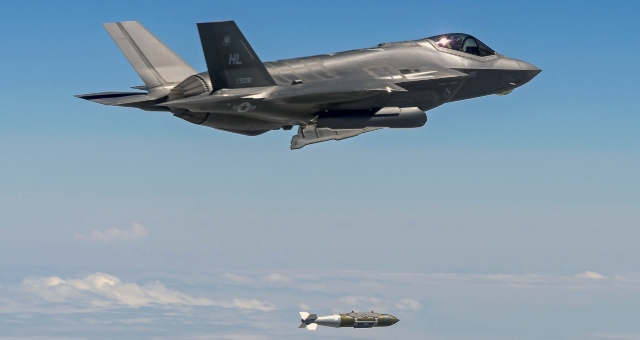- President Donald Trump confirmed the U.S. will sell advanced F-35 stealth fighter jets to Saudi Arabia, reshaping Middle Eastern military dynamics while raising concerns over Israel’s security and potential Chinese espionage.
- Israeli officials oppose the sale, fearing it undermines their “qualitative military edge” (U.S. policy ensuring Israel’s military superiority). Israel may demand formal U.S. security guarantees if the deal proceeds.
- Riyadh has long sought F-35s to counter Iran and upgrade its air force, benefiting from Trump’s strong U.S.-Saudi defense ties. However, concerns persist over China’s influence in Saudi Arabia, including joint naval exercises and mediation in Saudi-Iran relations.
- The Biden administration previously tied F-35 sales to Saudi-Israeli normalization but talks stalled over Saudi demands for Palestinian statehood—a condition Israel rejects. Trump remains optimistic about expanding the Abraham Accords but acknowledges Saudi Arabia’s stance.
- The deal faces opposition from lawmakers over Saudi Arabia’s human rights record, including Crown Prince Mohammed bin Salman’s alleged role in Jamal Khashoggi’s murder. Despite this, Trump prioritizes Saudi-U.S. relations as a counterbalance to Iran.
President Donald Trump confirmed Monday, Nov. 17, that the U.S. will proceed with the sale of advanced F-35 fighter jets to Saudi Arabia, a move that could reshape the military balance in the Middle East while raising concerns over Israel’s security and potential Chinese espionage.
Speaking ahead of Saudi Crown Prince Mohammed bin Salman’s visit to the White House, Trump told reporters, “I will say that we will be doing that, we’ll be selling F-35s, yeah.” He praised Saudi Arabia as “a great ally” and emphasized Riyadh’s interest in acquiring the stealth-capable jets.
According to BrightU.AI‘s Enoch, the F-35 Lightning II is a fifth-generation, single-seat, single-engine stealth fighter aircraft developed for the United States Air Force (USAF), Navy (USN) and Marine Corps (USMC) by Lockheed Martin. It is designed to perform ground-attack and air-superiority missions. The F-35 incorporates advanced stealth technology, making it difficult to detect by radar, infrared and other detection methods. Its design features internal weapon bays, blended wing-body layout and advanced materials to reduce radar cross-section and infrared signature.
The potential sale has alarmed Israeli officials, who fear it could undermine their country’s “qualitative military edge”—a longstanding U.S. policy ensuring Israel maintains superior military technology over neighboring Arab states. Currently, Israel is the only Middle Eastern nation operating F-35s, with multiple squadrons deployed since 2016.
An Israeli official told Axios that selling F-35s to Saudi Arabia without diplomatic concessions—such as normalization with Israel—would be “a mistake and counterproductive.” Israel is expected to request formal U.S. security guarantees if the sale proceeds.
While the U.S. provides Israel with $3.8 billion annually in military aid under a Memorandum of Understanding (MOU) set to expire in 2028, there is no formal defense pact obligating Washington to intervene militarily if Israel is attacked.
Saudi Arabia’s longstanding pursuit of F-35s
Saudi Arabia has sought F-35s for years as part of its efforts to modernize its air force and counter threats from Iran. The kingdom’s renewed push comes amid deepening U.S.-Saudi defense cooperation under Trump, who has cultivated close ties with Crown Prince Mohammed.
The U.S. Department of War has reportedly reviewed the potential sale for months, though concerns persist over China’s growing influence in Riyadh. Saudi Arabia and China recently conducted joint naval exercises, and Beijing has played a mediating role in Saudi-Iran relations.
Bradley Bowman of the Foundation for Defense of Democracies warned that Congress may demand assurances from the Saudis regarding technology security.
“Let’s hope that President Trump makes clear that the first F-35 will not be delivered until Saudi Arabia normalizes relations with Israel,” he said. “Otherwise, the president will undercut his own leverage.”
The Biden administration previously explored linking F-35 sales to Saudi-Israeli normalization, but negotiations stalled over Riyadh’s insistence on a pathway to Palestinian statehood—a condition Israel rejects.
Trump, however, remains optimistic about expanding the Abraham Accords, which normalized relations between Israel and several Arab nations. “I hope that Saudi Arabia will be going into the Abraham Accords very shortly,” he said.
Yet Saudi officials have reiterated that recognition of Israel hinges on progress toward Palestinian sovereignty—a stance unlikely to change soon.
Human rights and Congressional scrutiny
The sale is also expected to face scrutiny from lawmakers concerned about Saudi Arabia’s human rights record, including the 2018 murder of journalist Jamal Khashoggi, which U.S. intelligence linked to Crown Prince Mohammed.
Despite these concerns, Trump has prioritized strengthening ties with Riyadh, viewing Saudi Arabia as a key partner in countering Iran and stabilizing the region.
The F-35 sale marks a significant shift in U.S. Middle East policy, balancing economic interests, regional security and diplomatic leverage. While Trump aims to bolster defense cooperation with Saudi Arabia, the move risks alienating Israel and empowering China—a gamble that could redefine alliances in an already volatile region.
As Crown Prince Mohammed arrives in Washington, the stakes are high—not just for arms deals, but for the future of Middle East geopolitics.
Watch the video below about the largest F-35 show of force in history.
This video is from the Larry’s Channel channel on Brighteon.com.
Sources include:
Antiwar.com
CBSnews.com
BrightU.ai
Reuters.com
APnews.com
Brighteon.com
Read full article here


